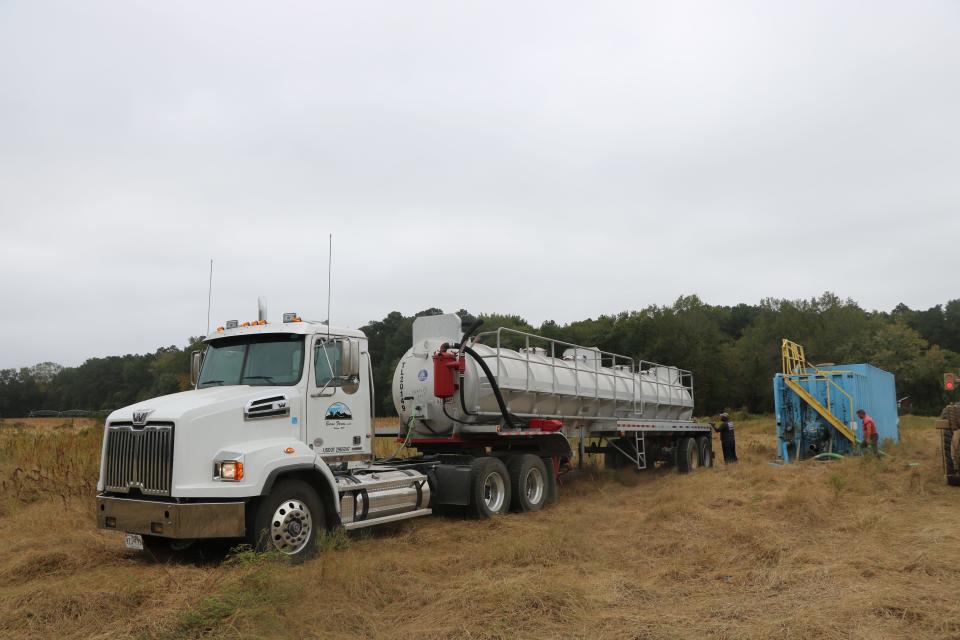Maryland takes aim at industrial sludge with new bills. Here's what's in works.
The recent legislative session of the Maryland General Assembly successfully took aim at the environmental impacts of industrial sludge in the state, especially on the heavily agricultural Eastern Shore.
The legislation will close a loophole in state oversight and keep Maryland on-par with neighboring states by:
Requiring a utilization permit for the use, storage and hauling of industrial sludge in the state;
Ensuring local governments issue all necessary approvals before someone can use sludge;
Authorizing the Maryland Department of Agriculture to enter and inspect any site where industrial sludge is used;
Increase penalties for users who willfully violate Maryland’s nutrient management regulations.
According to the Chesapeake Bay Foundation, these tools will help ensure industrial sludge is only used "safely and effectively in Maryland, limiting odors and health concerns, as well as preventing nutrients from entering local waterways and the Bay," they said in a statement.
The Delmarva Chicken Assocation likewise welcomed the new action by Maryland.
"The Delmarva Chicken Association has been working closely with the bill sponsors and the Maryland Department of Agriculture on amendments to the bill that address legislators’ concerns while not negatively impacting those who have responsibly stored or utilized DAF (Dissolved Air Flotation) material as a registered soil conditioner to better grow crops," said James Fisher, a spokesperson for the association.
More on closings in Salisbury Jubilant Cadista announces closure of its Salisbury operations. Everything to know.
'A major concern for Marylanders'

The Chesapeake Bay Foundation, ShoreRivers, Chesapeake Legal Alliance and local community members now urge Gov. Wes Moore to sign House Bill 0991 and Senate Bill 1074 into law along with a bevy of other legislation on his desk.
“Improper handling and application of industrial sludge causes it to spill and run off directly into our local waterways and ultimately into the Chesapeake Bay,” said Alan Girard, Maryland Advocacy Director at CBF. “It’s also a major concern for the Marylanders living near these sludge application and storage sites that drink well water and live off the land.”
Industrial sludge, sometimes referred to as food processing residuals or dissolved air flotation material, has been a controversial issue to farmers and communities across the state.
Proponents for its use on crops say it is a cheaper option to other forms of fertilizer. Meanwhile, environmental activists contend the smell and subsequent air pollution present health issues. Its runoff into the region's waterways also creates pollution and "dead zones" when it chokes off oxygen for sea life and water vegetation.
These are semi-solid leftovers derived from the rendering of protein, like poultry and seafood, that are then applied to farmland as an agricultural fertilizer. Overapplication and mishandling of this material allow it to runoff into waterways, putting local water quality and Bay health at risk. It also creates foul odors, harms neighboring communities and causes health concerns.
What is Dissolved Air Flotation?
Since Maryland currently does not require a permit for industrial sludge use, its safe and proper handling has come into question.
“Pollution concerns from the use and storage of industrial sludge have increased rapidly on the Eastern Shore — underscoring the urgency for state action to protect local rivers and creeks and hold accountable anyone who chooses to misuse DAF material in the future,” said Matt Pluta, Choptank Riverkeeper at ShoreRivers.
Unlike Maryland, neighboring states including Delaware and Virginia require a permit for handling and applying sludge, making it advantageous for rendering plants located there to ship their sludge to Maryland for disposal.
More on the recent session 'Maryland's win'? Gov. Moore assesses record of 2024 General Assembly session
According to a 2023 study by the University of Maryland, more than half of the industrial sludge land-applied in Maryland in recent years came from out of state.
“The smell of the industrial sludge being spread in our community has been unbearable, not to mention the negative environmental impacts,” said Jason Green, resident of Mayberry. “We are glad that our calls for much-needed regulation have been heard and supported by our delegation and CBF, and resulted in the passing of this legislation.”
How Wicomico County is dealing with sludge tanks

In September 2022, the Wicomico County Council successfully introduced a bill that could severely limit, if not ban, sludge tanks in the county. It was adopted on April 6, 2022, and took effect on June 6, 2022.
The bill ranged from banning future open-air sludge tanks to simply stipulating where they can be placed after a number of residents complained of noxious smells, medical issues and longstanding community safety concerns.
Locally, the Neighborhood Action Group, a community organization started by Hebron residents to raise awareness of sludge tanks, says an open-air tank now in Hebron can hold 3 million gallons, and was 23 feet tall, and 147 feet in diameter when its construction was completed in 2021. There is currently no uniform size for such tanks.
More on Eastern Shore poultry Eastern Shore poultry industry keeps growing, with turbulent mix of successes, challenges
Public hearings in Caroline, Carroll, Talbot, Dorchester, and Wicomico counties have already been held to discuss potential harms to human health, the environment and personal livelihood caused by poor sludge handling. Counties including Caroline and Wicomico have acted to ban storage of the material as bills like this make their way through the legislative process.
This article originally appeared on Salisbury Daily Times: Industrial sludge in Maryland crosshairs. Here's what's in works.
